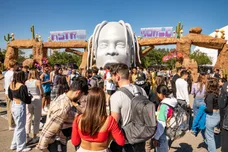When reviewing DJ Khaled's last album, I Changed A Lot, a mere nine months ago, I wondered how much longer the We The Best titan could keep up his album formula of "bright, of-the-moment beats, song titles that could double as all-caps Instagram captions and featured artist pairings that are awards show-level weird." The rap game Oprah ("You get a verse, you get a verse, here's a hook for you!") has, for the past decade, had a musical career that's matched his outsized personality in its confidence and obsession with wealth and status. On Khaled albums, cohesiveness and concept kneel in fealty to chart-chasing and maxed-out starpower. He's attracted some ire from rap fans for optimizing this strategy within a format that's usually expected to pack in more thematic heft than mixtapes or loosies, but with his record of hits, who can blame him for constructing one incoherent dream team after another?
Oddly enough, just when he's increased his public reach thanks to Snapchat, an Apple Music deal, and festival-headlining sets that feature someone doing his DJ duties for him, he seems to be attempting to flip the script ever so slightly on Major Key. This album's first five songs feature only eight credited vocalists; I Changed A Lot's first five featured sixteen. Khaled's previous three albums had two solo joints apiece, and the ones before that had even fewer (if any); Major Key has four. High-octane opener "I Got The Keys" has everything we'd expect from a Khaled joint-- production from an of-the-moment beatsmith (Southside) and an unpredictable-but-palatable blend of guests (Future and Jay-Z)-- but the ensuing four tracks deviate quite a bit from Khaled's tried-and-true formula. Like "I Got The Keys," Drake's "For Free" also features a producer who's within the rapper's inner circle (Nineteen85), but features no guests on what sounds like it could be a huge single-- a decidedly un-Khaled strategy.
Beyond that, "I Got The Keys," "Nas Album Done," "Holy Key," and "Jermaine's Interlude" all have a thematic through-line-- possibly a first on a Khaled album. It's easy to forget now that he's so ubiquitous, but Khaled's story is one of persistent independence, and these songs echo that. Jay: "'Til you own your own you can't be free." Nas: "Start a label, run it, sign yourself." Kendrick: "Brand endorsement joining forces with sorcerers signing me/I destroy and divorce what you eating, don't you hire me." Cole: "Tables do turn and labels do burn/The second they ask you to sell your soul/Don't you do it, don't you fold." This shared narrative-- that self-made success is preferable to signing with a major label or "selling out"-- is an odd one to find on an album by hip hop's most shameless radio hound and his various mercenaries, but clearly none of the hired hands equate collaborating with Khaled to selling your soul.
Soon enough though, this initial wave of more focused tracks gives way to standard Khaled bloat. He's done six-guests-on-one-song before (I believe twelve is his record), but rarely has it felt as crowded as "Do You Mind," where everybody except Rick Ross is singing over each other. Future gets interrupted seven bars into his verse, the nearly identically-voiced August Alsina and Chris Brown play "Attack of the Clones" over an old Usher hook, and Nicki Minaj randomly pops back in with an awkwardly-placed bridge. If you asked a child to build a house out of a jumbled bucket of Legos, but instead of a house it was a pop song, and the plastic bricks were various famous artists, you'd end up with "Do You Mind." Equally as puzzling is "Work For It," a track featuring another Usher interpolation and the album's most disconnected verses. For 3/4ths of the song, Big Sean talks about giving up everything for a woman, and then Gucci Mane and 2 Chainz barrel in with four bars apiece that have absolutely nothing to do with the concept Sean is pushing. Verses gifted to Khaled, it would seem, never lay around for years-- they burn holes into his pockets until they're flung onto whatever track has eight unused bars.
The back half of Major Key more closely resembles I Changed A Lot in its chaos and lack of well-defined character, but it's even messier. There are bright spots to be sure-- on "Don't Ever Play Yourself," Jadakiss turns in a verse chock full of cocaine puns that probably have Pusha T slapping himself for not inventing first (sample: "I'd rather be bumper-to-bumper in drug traffic"), Fat Joe name-checks Brian Scalabrine, and Kent Jones magnificently shit-talks about his hit single-- but especially compared to the album's front end, it plays pretty weak.
One problem that plagues the album throughout, and almost counteracts the narrative continuity, is the fact that Major Key is the first Khaled album to sound like it's made up of outtakes from its featured artists' own projects. French Montana's the only one who's gone on record confirming that he gifted Khaled a leftover from his upcoming album (MC4), but other cuts also seem too in-line with artists' solo work to have been constructed in the Khaled lab. "For Free" is one big OVO party-- it's produced by Nineteen85 and samples a Majid Jordan guitar lick; Big Sean references his TWENTY88 song "Deja Vu" on "Work For It," suggesting that his verses may have been cut from that project; "Jermaine's Interlude" just sounds like a straight-up J. Cole song; Nas straight up says, "Khaled called me when I was in album mode/So I put it on hold for the Major Key." Hate it or love it, Khaled developed a high-octane, maxed-out sound years ago, and these tracks are decidedly not that. It'd be one thing if he made a conscious decision to construct a more minimal, concept-focused album, but instead, it seems like he was just a vulture circling above other artists' outtakes and unreleased verses.









